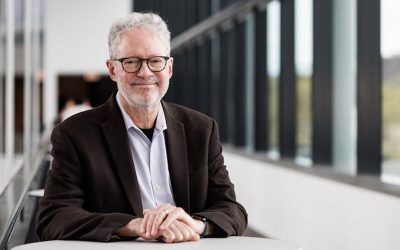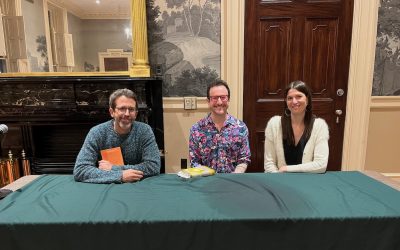The pursuit of a class at Drew Theological School led to advanced degrees and a new vocation
December 2021 – We recently sat down with Tanya Linn Bennett T’00, G’05, T’11, associate dean for vocation and formation, associate professor in the practice of public theology and vocation, and University chaplain to discuss her lifelong connection with Drew Theological School.
Your relationship with Drew has been lifelong and multi-generational. How has this shaped your vocational career path?
My father was in seminary at Drew Theological School when I was born. My first home was in the Tipple Complex on campus. When I was eight years old, my father returned to Drew as the University chaplain, later the dean of students. I grew up attending events on campus—basketball games, communion services, and multi-faith gatherings. I was also very active in my local United Methodist Church (UMC)—singing in choirs, going on mission trips, and chairing the youth group.
As an adult, I had a career in corporate communications and non-profit consulting before I returned to Drew in the fall of 1997. I was seeking one class to enhance my youth ministry skills as I was an active lay youth advisor. The admissions director convinced me to take at least nine credits so I could qualify for a scholarship.
By January of 1998, I was a full-time student, working for the Theological School Admissions Office, and registered for ordination in the UMC. I think the model of joining academics and ministry together is one that is compelling for me as it brings together my love of teaching and relationship to students—not only in the classroom, but also as they explore their faith, engage religion as a system of meaning-making, and consider how religion informs their identities as leaders in the world.
"It is always my hope to challenge students to think beyond the 'ordinary' and step into unique and interesting opportunities that may afford them ongoing professional training and certifications as well as practical experience."
As the Associate Dean for Vocation and Formation at Drew, how does your office prepare students for placement in internships and experiential learning opportunities?
As soon as students express an interest in applying to Drew, my office begins to ask what they hope a theological degree will do for them as they shape or reshape their identities as religious leaders for a variety of potential roles and contexts.
As the faculty worked together to construct the rooted courses for the Master of Divinity (MDiv) and Master of Arts in Theology and Ministry (MATM) programs, we asked ourselves what we needed to ask our students in order for these courses, our classrooms, and our conversations to generate or encourage a vocational goal.
The very first assignment students submit during the first semester course Identity, Spirituality, and Vocation is a paper answering the question, “Why am I here?” All MDiv and MATM students will undergo an internship interview starting in January of their first full year, resulting in a placement beyond campus that aligns with their vocational goals. When we make these placements, it is not only with the intention of strengthening their skill set for the ministry or the service the students wish to pursue, but also to begin to create a network of professionals who may become colleagues as students seek permanent employment post degree completion.
It is always my hope to challenge students to think beyond the “ordinary” and step into unique and interesting opportunities that may afford them ongoing professional training, certifications, professional associations, and practical experience.
As a Drew alum, what is the importance of networking with other Drew alums? How can mentoring and networking benefit alums, students, and the Theological School?
Alums are a vital part of our professional development program—supervising interns and walking alongside current Drew students. We are currently working closely with the Drew Advancement Office to revitalize the Drew Theological School Alumni Council to support and develop relationships among alums for their own networking, peer mentoring, and collegial connections. We have contacted students located in targeted geographic areas around the U.S. to create regional networks of Drew Theo alums. Our next step will be to develop these same networks in nations globally where Drew Theo has significant alum populations. As always, we ask alums to give back to Drew by supporting current students through the Annual Fund.
Through these networks, we can invite alums to participate in chapel, lectures, and other open forums—opportunities made all the more accessible since we’ve been offering these opportunities virtually.
It has been inspiring to have these cultivating conversations with our alums—their response has been overwhelmingly enthusiastic and eager, and their willingness to contribute to the ongoing work and life of the Theological School is exciting.



